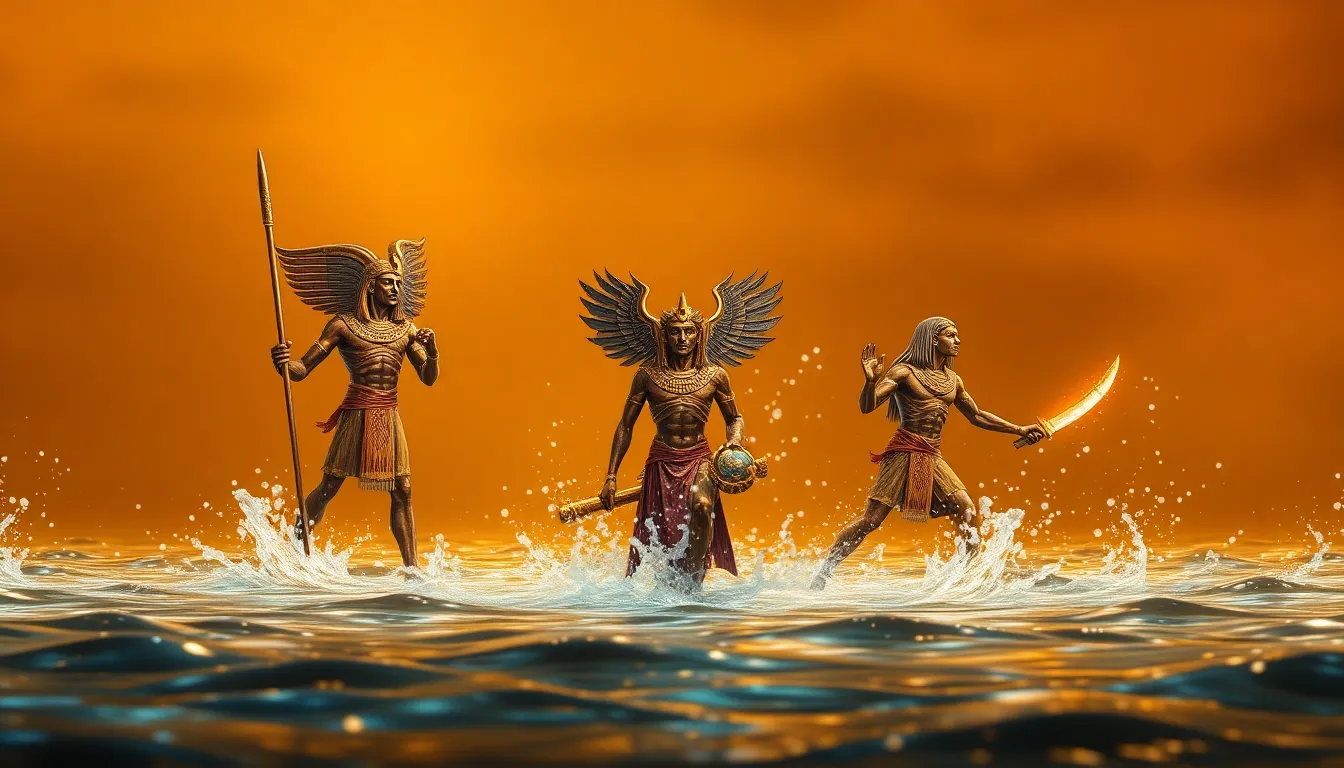The Wrath of the Nile: How Water Deities Enforced Retribution
I. Introduction
The Nile River, often regarded as the lifeblood of ancient Egypt, played a pivotal role in the development of Egyptian civilization. Its annual flooding provided fertile soil that sustained agriculture, making it essential for trade and sustenance. This life-giving river was not only a source of prosperity but was also imbued with spiritual significance, manifesting through various water deities in Egyptian mythology. These deities were believed to govern the waters and maintain balance, enforcing retribution against those who disrespected their power. This article explores the perception of the wrath of Nile’s deities as a form of retribution in ancient Egypt.
II. The Nile: Lifeblood of Ancient Egypt
The Nile’s significance in ancient Egyptian culture cannot be overstated. It was the primary source of irrigation, enabling the growth of crops and supporting a burgeoning population. Furthermore, the river facilitated trade routes that connected Egypt with neighboring regions, contributing to its wealth and influence.
However, the Nile’s seasonal flooding was a double-edged sword. While it brought life and prosperity, it could also lead to devastating consequences. The dual nature of the Nile can be summarized as follows:
- Blessing: Fertile silt deposited on the banks, enhancing agricultural output.
- Cursed: Destructive floods that could sweep away homes and livelihoods.
This delicate relationship between the Nile’s behavior and societal stability meant that the ancient Egyptians closely monitored its cycles, believing that the river’s mood reflected the favor of the gods.
III. Key Water Deities in Egyptian Mythology
Central to the mythology surrounding the Nile are several key water deities, each embodying different aspects of the river and its effects on life. The principal deities include:
- Hapi: The god of the annual flooding of the Nile, Hapi represented abundance and fertility. He was often depicted as a bloated man with a beard and carrying offerings.
- Sobek: A crocodile-headed god associated with the Nile’s waters, Sobek was revered for his protective qualities. He was linked to the fertility of the land and the power of the waters.
- Osiris: While primarily a god of the afterlife, Osiris was also connected to the Nile. His death and resurrection symbolized the cyclical nature of the river’s flooding and the agricultural seasons.
Water in Egyptian mythology symbolized life, death, and rebirth, serving as a reminder of the interconnectedness of all existence.
IV. The Concept of Retribution in Ancient Egyptian Belief
Retribution, in the context of Egyptian mythology, was understood as a divine response to human actions, particularly those that violated the natural order or disrespected the gods. The ancient Egyptians believed that failing to honor the deities could provoke their wrath, resulting in dire consequences.
Actions that could provoke the wrath of the Nile deities included:
- Disrespecting sacred sites associated with the Nile.
- Neglecting rituals and offerings meant to appease the gods.
- Engaging in practices that harmed the environment or disrupted the balance of nature.
The moral and ethical framework guiding interactions with the gods emphasized the importance of living in harmony with the world around them, ensuring that the Nile remained a source of life rather than destruction.
V. Myths and Legends of Divine Retribution
Numerous myths and legends illustrate the concept of divine retribution associated with Hapi and Sobek. These stories served as cautionary tales, warning the populace of the potential consequences of neglecting their duties to the gods.
For example, one notable story recounts how Hapi unleashed devastating floods upon a village that failed to make proper offerings. The villagers, realizing their mistake, sought forgiveness through elaborate rituals, illustrating the necessity of respecting the river’s deities.
These myths not only entertained but also educated the populace about the importance of honoring the Nile, reflecting societal values and fears regarding the capriciousness of nature and divine power.
VI. Rituals and Offerings to Appease the Deities
To maintain the favor of the water deities, the ancient Egyptians engaged in various rituals and offerings. These practices were integral to their religious life and community cohesion.
Typical rituals included:
- Festivals celebrating the Nile’s flooding, such as the Wepet-Renpet festival.
- Offerings of food, flowers, and symbolic items placed in the river.
- Prayers and songs dedicated to the deities, often performed by priests.
These offerings were believed to be necessary for averting divine wrath and ensuring a bountiful harvest. Community involvement in these practices fostered a sense of shared responsibility and reverence for the Nile.
VII. Historical Events Attributed to Divine Retribution
Throughout history, the ancient Egyptians interpreted natural disasters such as droughts, floods, and famines as manifestations of divine punishment. These events had profound effects on governance and social order.
For instance, a severe drought might be seen as a sign that the gods were displeased, prompting the ruling pharaohs to take immediate action to appease the deities. Such interpretations often influenced political decisions, leading to increased religious practices or reforms in governance.
Specific historical events, such as the famine during the reign of Pharaoh Djoser, were attributed to the anger of the gods, reinforcing the belief that the Nile’s behavior was a direct reflection of societal conduct.
VIII. Conclusion
The relationship between the Nile’s water deities and the concept of retribution highlights the profound connection ancient Egyptians had with their environment. Through myths, rituals, and societal practices, they navigated the complexities of life governed by the whims of the Nile.
Even today, the legacy of these beliefs endures, reminding us of the significance of water as a life-giving force and the potential consequences of its wrath. The Nile shaped not only Egyptian civilization but also its spirituality, echoing through the ages as a testament to the enduring power of nature and the divine.




